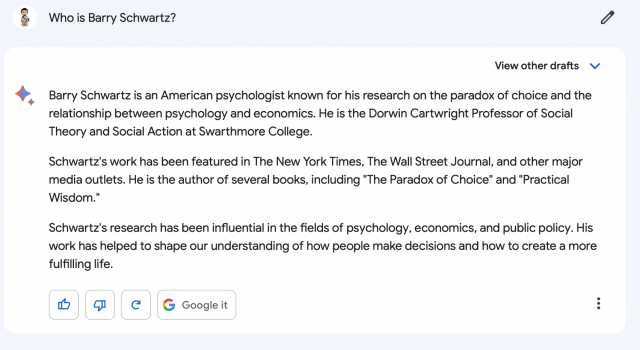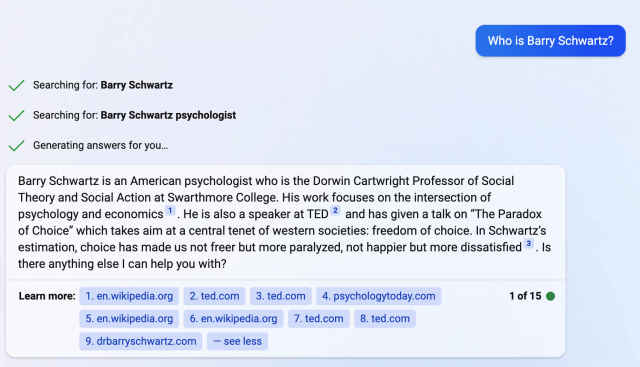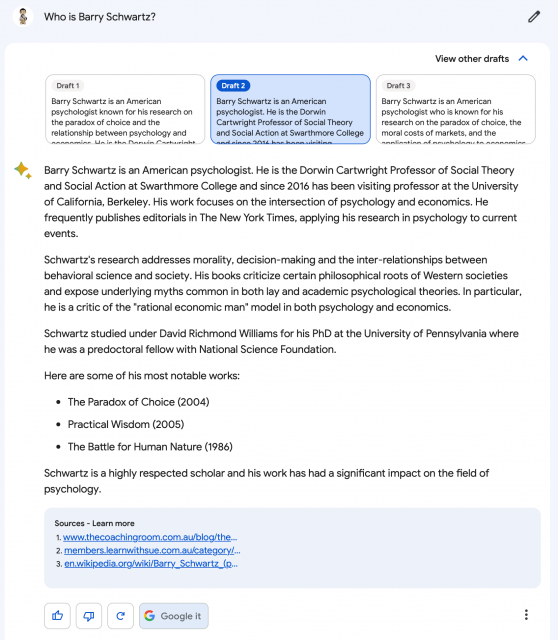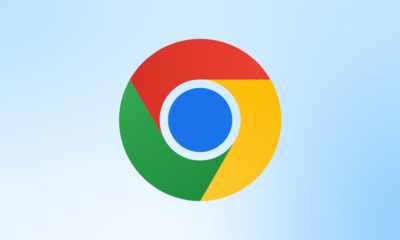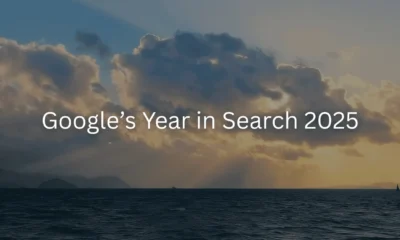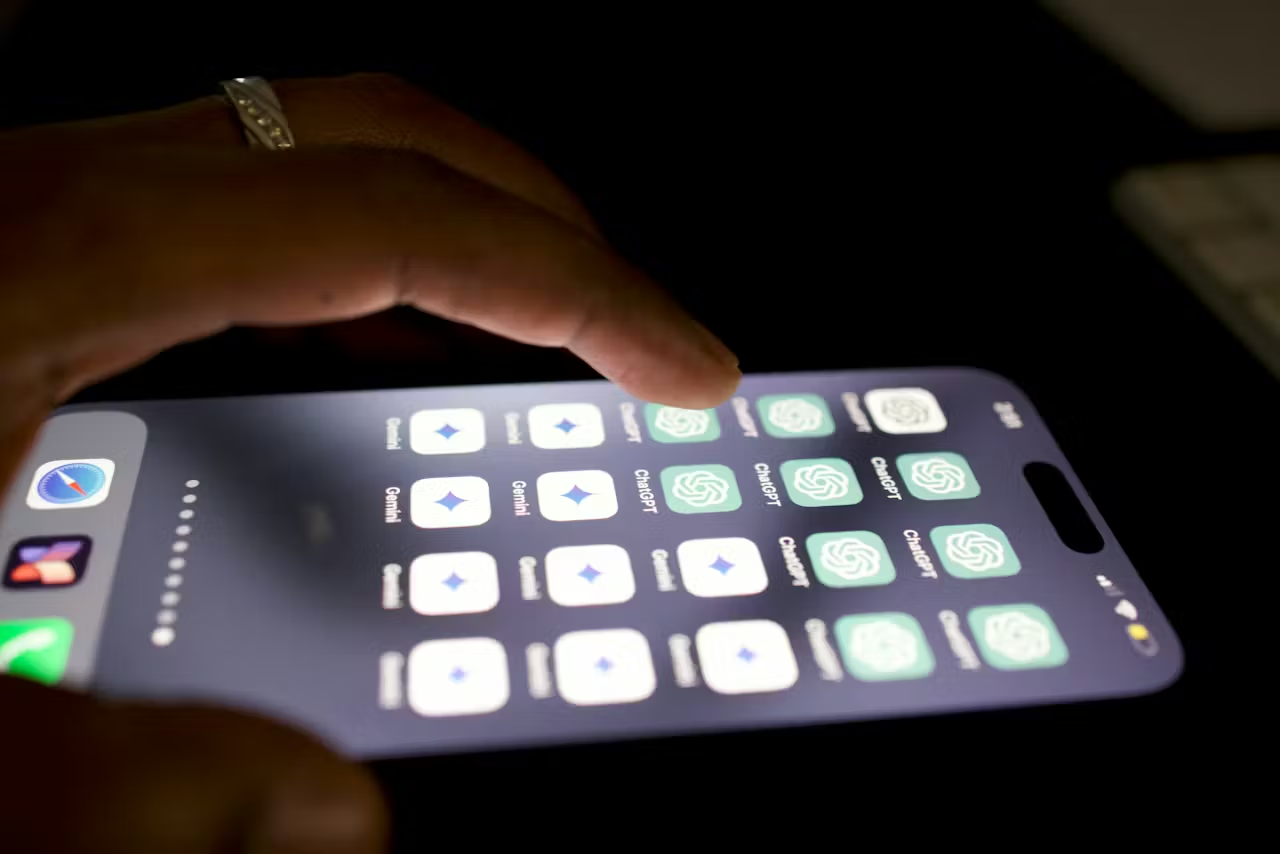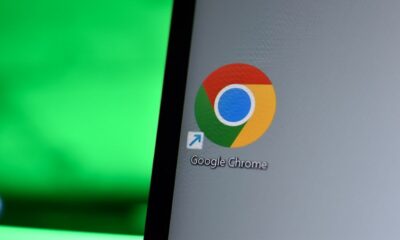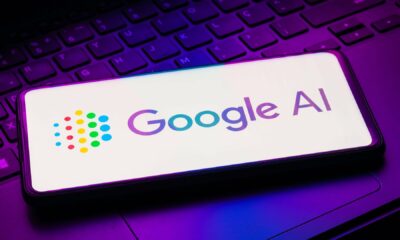SEARCHENGINES
Google Bard Won’t Link To Sources Too Often
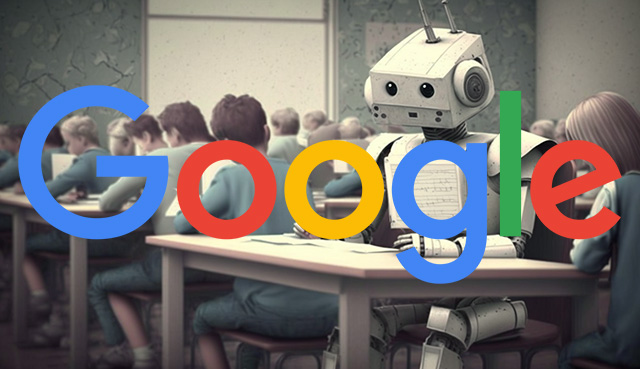
As you know, we’ve been playing with Google Bard, it just started to roll out a couple of days ago. Early on, we were disappointed thus far with how limited it seemed and more so, how it rarely linked to sources and content creators. Now, Google got back to us on why this is the case.
Google added a few topics to the Bard FAQs, including “How and when does Bard cite sources in its responses?” Let me quote what it says:
Bard, like some other standalone LLM experiences, is intended to generate original content and not replicate existing content at length. We’ve designed our systems to limit the chances of this occurring, and we will continue to improve how these systems function. If Bard does directly quote at length from a webpage, it cites that page.
Bard was built to be a creative and helpful collaborator—it works well in creative tasks like helping you write an email or brainstorm ideas for a birthday party. We see it as a complementary experience to Google Search. That’s why we added the “Google It” button to Bard, so people can easily move from Bard to explore information from across the web.
Bard is an experiment, and we’ll use its launch as an opportunity to learn, iterate, and improve the experience as we get feedback from a range of stakeholders including people like you, publishers, creators, and more.
So since Bard “generates original content and not replicate existing content at length,” Google does not feel the need to cite sources? Bard will however cite sources and link to them if Bard “directly quotes at length from a webpage.”
Instead, Google wants you to go from Bard to Google with the “Google It”, “so people can easily move from Bard to explore information from across the web.” So click on links from Google Search, do not click on links from Bard, too often.
But things with Bard are early and may change, “Bard is an experiment, and we’ll use its launch as an opportunity to learn, iterate, and improve the experience as we get feedback from a range of stakeholders including people like you, publishers, creators, and more.”
Honestly, I am shocked, I did not think Google would launch Bard without citing and linking to sources as much as and as well as Bing Chat does. Even Gary Illyes from Google hinted publishers would be okay with it.
Let me show some examples (click on the images to enlarge).
Google Bard on “Who is Barry Schwartz?” – this is not me, this is the famous Barry Schwartz, by the way:
No citations with the default response from Google Bard.
But Bing, it gives 15 links to 15 different sources:
To be fair, if I work hard, and go to draft two, I get some citations from Google Bard:
I posted about this on Twitter and here is some of the response and reaction to Google’s FAQ statement on the citation bit:
What a joke. Absolutely brazen content theft.
— Don Caldwell 🦑 (@DonCald) March 22, 2023
Meanwhile, Google could care less: https://t.co/QQmZ1jA8WK
— Rutledge Daugette (@TheRealRutledge) March 22, 2023
A positive perspective: Bard is bound to say weird things and give inaccurate information. If that’s the case, you won’t necessarily want your brand up there co-signing certain conversations or answers.
— dog excited to meet pluto (@dogmeetpluto) March 22, 2023
That’s not great for site owners.
I’ve also seen a number of people share Bard responses that are questionable or outright wrong. Responses should be treated like discussing a topic with a questionably-informed internet rando, rather than a factual response if there’s no source.— Peggy K (@PeggyKTC) March 22, 2023
Uggh. No/Minimal citations is a big negative for me. (both as a creator, and potential user of Bard)
— ElizabethH (@ElizabethH15) March 22, 2023
IMHO it’s impossible to overstate what an enormous problem this is for publishers. If citations are not prevalent and prominent, publishers should be able to opt out of being used in training data without it having any affect on SEO. And every publisher should opt out.
— Michael Magnuson (@mdmagnuson) March 22, 2023
To be honest, the user in me prefers Bard’s UI/UX compared to Bing Chat.
The SEO in me hates the lack of sources, but the way Bing Chat has them incorporated just looks a bit naff.
— Chloe Ivy Rose (@chloeivyroseseo) March 22, 2023
That’s a massive miscalculation on their side, it’s the wrong result that they will need to address
— @[email protected] (@davidiwanow) March 22, 2023
I mean this section is *interesting*…
“For now, Google Bard likely won’t be sending a lot of traffic to the web or websites.”And likely a challenge for anyone trying to do research.
— Crystal Carter (she/her) (@CrystalontheWeb) March 22, 2023
I actually think #Bard could work very well for local if Google was willing to include URLs, use more its local knowledge graph and offer Maps links. pic.twitter.com/YZLB1DrY3u
— Greg Sterling 🇺🇦 (@gsterling) March 22, 2023
The same thought I had when started playing with it https://t.co/RllWsaQ9KQ
— Gianluca Fiorelli (@gfiorelli1) March 22, 2023
One shimmer of hope is that if and when Bard is integrated some how into Google Search, those integrations you will see more prominent links to content creators. Via the WSJ, “Sissie Hsiao, a vice president in charge of Google Assistant, said the company “is deeply committed in supporting a healthy and vibrant content ecosystem” and “will be welcoming conversations with stakeholders.” She said when AI tools are integrated into search the company will give priority to sending valuable traffic to content creators. “
Good to hear from Google’s Sissie Hsiao about Bard for Search + Citations -> “She said when AI tools are integrated into search, the company will give priority to sending valuable traffic to content creators.” https://t.co/K3U82vtAu6 pic.twitter.com/xWbRl7SLRs
— Glenn Gabe (@glenngabe) March 22, 2023
So we will see. Until now, prepare to be disappointed with any little traffic you might see from Google Bard.
Forum discussion at Twitter.

